Should America Go to the Moon Again Statistics
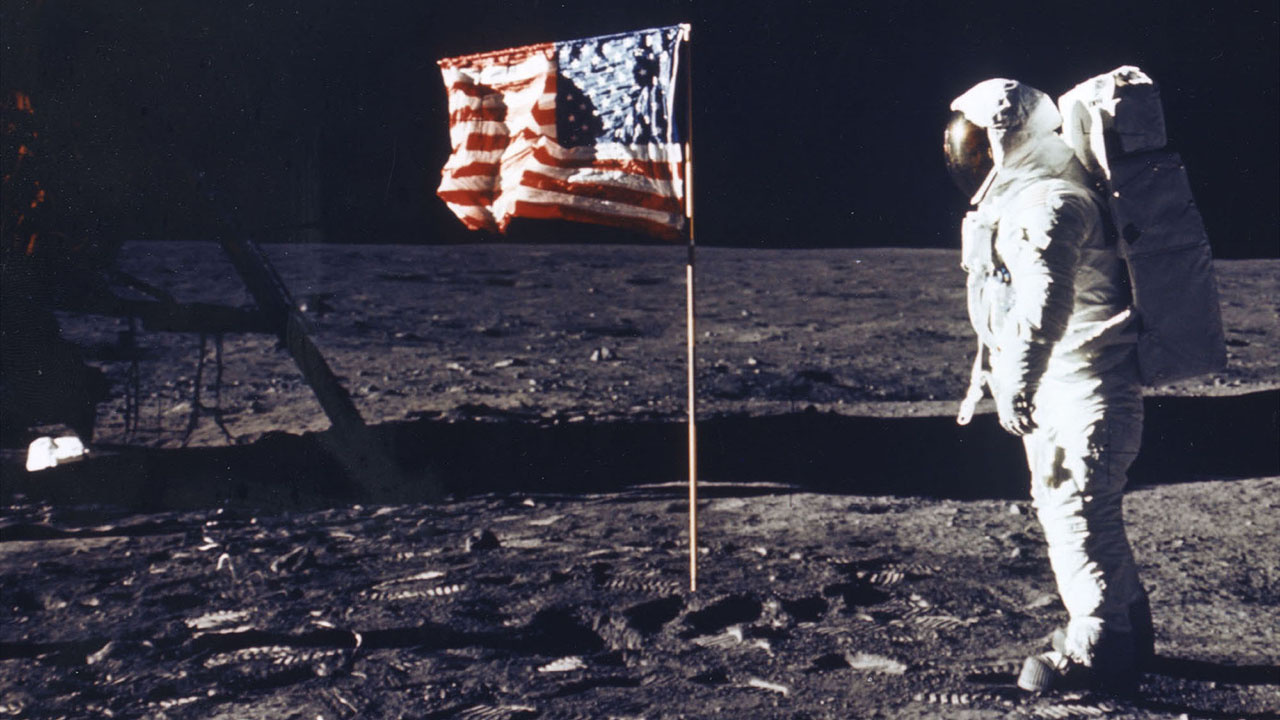
This calendar week marks the 50th anniversary of the Apollo 11 moon landing, which was the showtime time humans prepare foot on the moon. The United States remains the but country to take put people on the moon, and, every bit of 2018, the large bulk of Americans consider it essential that the U.South. go on to exist a leader in space exploration. Still, many Americans do not recollect futurity manned trips to the moon – or to Mars – should be a high priority for NASA. Instead, they put college priority on other roles such as monitoring Earth's climate or asteroids that could hit Earth.
Here are half dozen Pew Research Centre findings nearly Americans' views of infinite travel.
1Most Americans remember sending astronauts to Mars or the moon should exist a lower priority for NASA – or say it should not be done at all. While a majority of Americans (58%) said in a 2022 survey that human being astronauts are essential to the futurity of the U.Southward. space program, less than one-in-five describe sending human astronauts to Mars (eighteen%) or the moon (13%) as top priorities for NASA. Americans are more than likely to charge per unit these goals as "important but lower priorities" (45% and 42%, respectively), or to say they are not important or should non be done at all (37% and 44%).
NASA has not put a man on the surface of the moon since the Apollo 17 mission in 1972. But but final calendar month, NASA announced plans to put the get-go woman on the moon in 2024 every bit part of the Artemis plan. The plan also aims to put human beings on the surface of Mars by the 2030s.
2 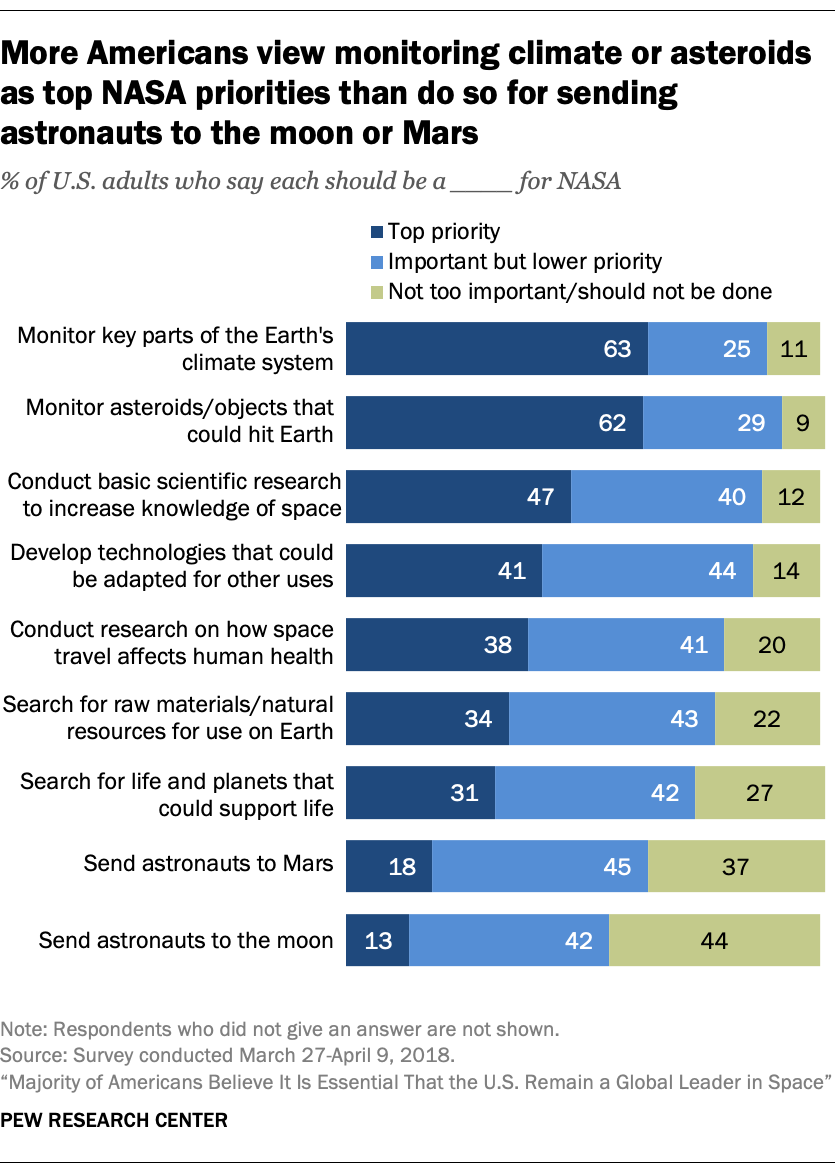 Americans see priorities other than a moon or Mars landing as more than pressing for NASA. About vi-in-ten (63%) say one of the arrangement's pinnacle priorities should be using infinite to monitor key parts of Earth's climate organization. About iv-in-ten or more said other superlative priorities should include conducting basic scientific enquiry to increase knowledge of space (47%) and developing technologies that could be adapted for other uses (41%).
Americans see priorities other than a moon or Mars landing as more than pressing for NASA. About vi-in-ten (63%) say one of the arrangement's pinnacle priorities should be using infinite to monitor key parts of Earth's climate organization. About iv-in-ten or more said other superlative priorities should include conducting basic scientific enquiry to increase knowledge of space (47%) and developing technologies that could be adapted for other uses (41%).
3 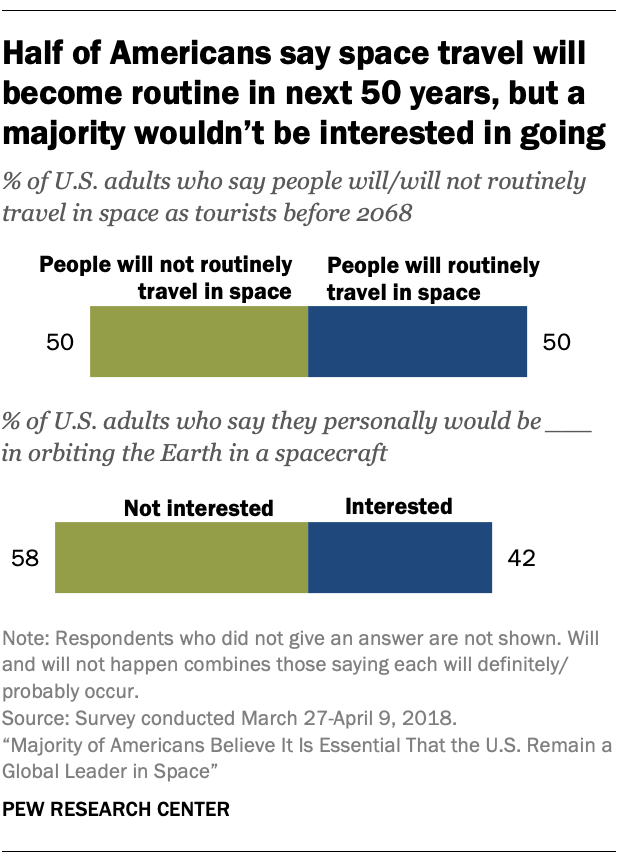 Half of Americans call up space travel volition become routine during the next 50 years of infinite exploration. Private companies like Virgin Galactic and SpaceX have plans to take tourists on suborbital space flights in the future. NASA besides recently appear that it would open the International Space Station upwardly for tourists. For now, these trips will exist prohibitively expensive for the average person – for example, Virgin Galactic's tickets toll nigh $250,000, and NASA estimates one trip to the space station would cost most $58 million. Still, half of Americans expect infinite travel to go routine past 2068.
Half of Americans call up space travel volition become routine during the next 50 years of infinite exploration. Private companies like Virgin Galactic and SpaceX have plans to take tourists on suborbital space flights in the future. NASA besides recently appear that it would open the International Space Station upwardly for tourists. For now, these trips will exist prohibitively expensive for the average person – for example, Virgin Galactic's tickets toll nigh $250,000, and NASA estimates one trip to the space station would cost most $58 million. Still, half of Americans expect infinite travel to go routine past 2068.
Even so, even if space travel does get commonplace, more than than half of Americans (58%) say they would non be interested in going. People who aren't interested in orbiting the Globe in a spacecraft cite a number of concerns, including thinking it would be also expensive or scary or that their health or age would not allow for rubber travel. Amongst the 42% who would be interested, the about common reason is that they want to experience something unique.
four 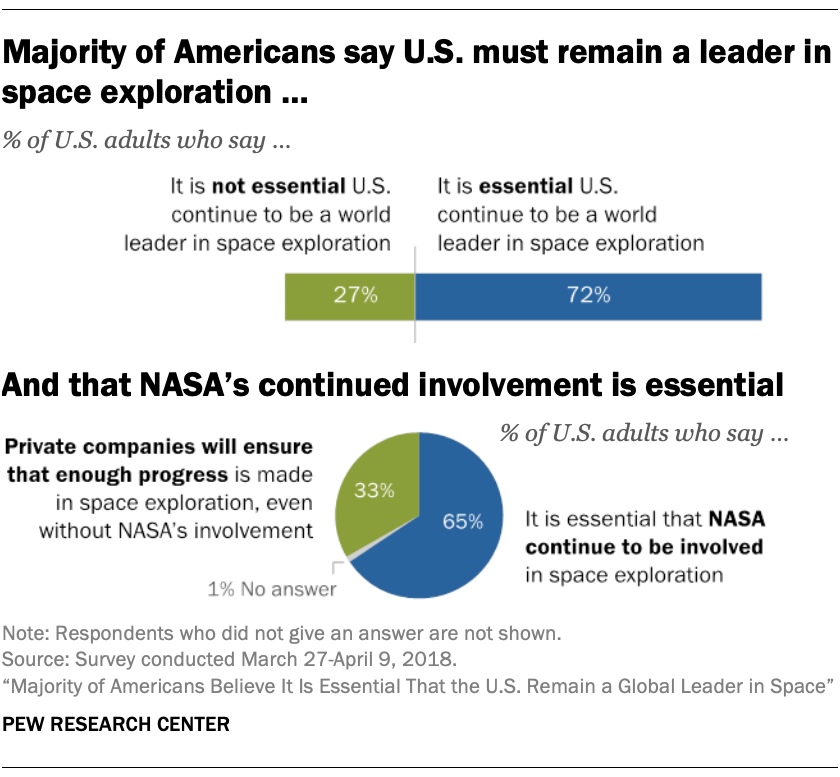 A majority of Americans say the U.South. must remain a global leader in infinite exploration, and that NASA's continued involvement is essential. The large majority of Americans (72%) say it is essential that the U.S. continue to be a globe leader in infinite exploration; just 27% say it is non essential. This sentiment is shared equally across generations and among Republicans and Democrats.
A majority of Americans say the U.South. must remain a global leader in infinite exploration, and that NASA's continued involvement is essential. The large majority of Americans (72%) say it is essential that the U.S. continue to be a globe leader in infinite exploration; just 27% say it is non essential. This sentiment is shared equally across generations and among Republicans and Democrats.
A majority of Americans (65%) besides describe NASA'southward connected involvement in space exploration as essential. Some other 33% say that private companies will ensure that enough progress is made in space exploration, even without NASA's involvement. Democrats and Democratic-leaning independents (lxx%) are more than likely than Republicans and Republican-leaning independents (59%) to say NASA must continue playing a office in space exploration. Conversely, Republicans (41%) are more likely than Democrats (28%) to say private companies will ensure that enough progress is made.
v  Americans take little conviction that private space companies will minimize space droppings. Just thirteen% of Americans say they have a cracking deal of confidence that individual space companies volition minimize the amount of human-made space debris that they put into Earth'due south orbit – including fragments of rockets, satellites and other human-fabricated objects. Well-nigh half (51%) of Americans say they have not too much or no conviction at all that private companies volition minimize the debris they create.
Americans take little conviction that private space companies will minimize space droppings. Just thirteen% of Americans say they have a cracking deal of confidence that individual space companies volition minimize the amount of human-made space debris that they put into Earth'due south orbit – including fragments of rockets, satellites and other human-fabricated objects. Well-nigh half (51%) of Americans say they have not too much or no conviction at all that private companies volition minimize the debris they create.
Infinite debris, sometimes called "space junk," is a growing concern. NASA estimates that more than than 23,000 pieces of space debris 10 centimeters or larger are orbiting the Earth, and these objects could damage important spacecraft like the International Infinite Station.
While Americans are skeptical that private companies volition limit the debris they create, they are more confident that these firms will make a profit: 44% say they have a neat bargain of confidence that companies like SpaceX, Blueish Origin or Virgin Galactic volition exercise this, and another 36% say they have a fair amount of confidence.
6 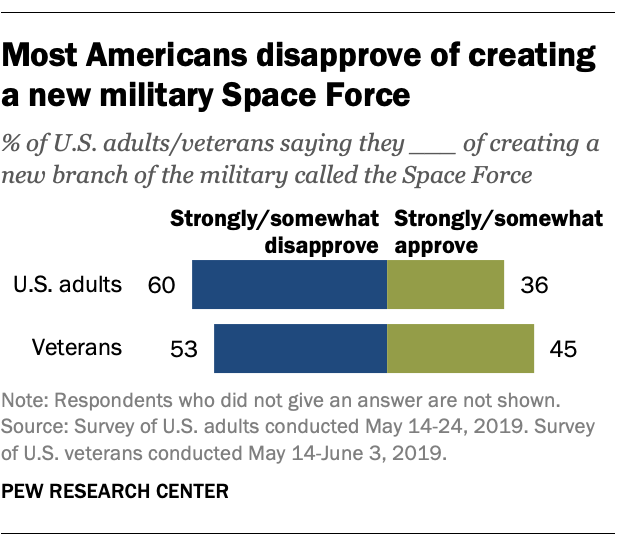 Americans are not enthusiastic nigh the idea of creating a military machine Space Force. The U.Southward. Section of Defense has long had satellites orbiting World, and the notion of a larger American military presence in infinite has been around since the 1960s. While President Donald Trump has talked nigh creating a Infinite Force equally an entirely new branch of the war machine, most members of the public are non on-board with this plan: A May 2022 Pew Research Center survey found 36% of Americans approve of creating a military machine Space Forcefulness, while sixty% disapprove. U.Due south. military veterans are more evenly split on this idea, but nonetheless more disapprove (53%) than approve (45%).
Americans are not enthusiastic nigh the idea of creating a military machine Space Force. The U.Southward. Section of Defense has long had satellites orbiting World, and the notion of a larger American military presence in infinite has been around since the 1960s. While President Donald Trump has talked nigh creating a Infinite Force equally an entirely new branch of the war machine, most members of the public are non on-board with this plan: A May 2022 Pew Research Center survey found 36% of Americans approve of creating a military machine Space Forcefulness, while sixty% disapprove. U.Due south. military veterans are more evenly split on this idea, but nonetheless more disapprove (53%) than approve (45%).

Courtney Johnson is a sometime enquiry associate focusing on scientific discipline and society at Pew Research Center.
williamsfance1971.blogspot.com
Source: https://www.pewresearch.org/fact-tank/2019/07/17/how-americans-see-the-future-of-space-exploration-50-years-after-the-first-moon-landing/
0 Response to "Should America Go to the Moon Again Statistics"
Post a Comment